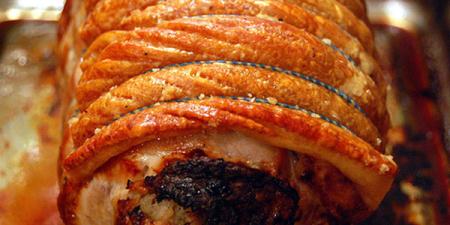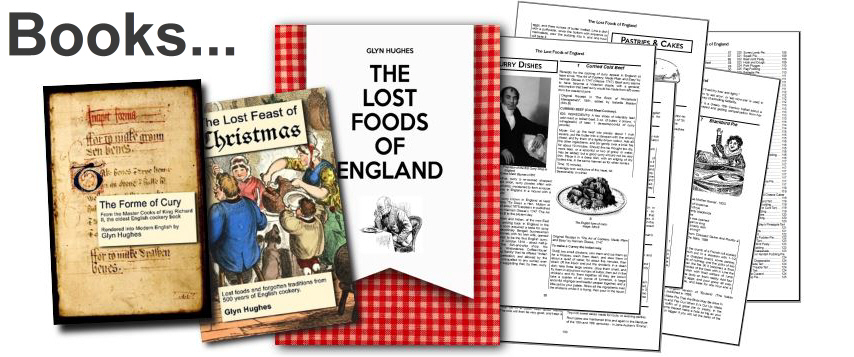

|
 The outer rind of a pork joint, roasted very hot so as to crisp, and served with the joint. When cut into gobbets and served separate from the joint, it is Pork Scratchings.  Roast Pork with Crackling Image: www.devonshire-gourmetsalts.co.uk In ‘The Cook’s Oracle‘ William Kitchiner (Kitchiner 1830) quotes Moubray’s ‘Treatise on Domestic and Ornamental Poultry‘, 1816, page 242; “The western pigs, from Berks, Oxford, and Bucks, possess a decided superiority over the eastern, of Essex, Sussex, and Norfolk; not to forget another qualification of the former, at which some readers may smile, a thickness of the skin; whence the crackling of the roasted pork is a fine gelatinous substance, which may be easily masticated; while the crackling of the thin-skinned breeds is roasted into good block tin, the reduction of which would almost require teeth of iron.”  Original Receipt in ‘The Book of Household Management‘ edited by Isabella Beeton, 1861 (See Mrs.B) Original Receipt in ‘The Book of Household Management‘ edited by Isabella Beeton, 1861 (See Mrs.B)ROAST LEG OF PORK. [Illustration: ROAST LEG OF PORK.] 800. INGREDIENTS. – Leg of pork, a little oil for stuffing. (See Recipe No. 504.) Mode. – Choose a small leg of pork, and score the skin across in narrow strips, about 1/4 inch apart. Cut a slit in the knuckle, loosen the skin, and fill it with a sage-and-onion stuffing, made by Recipe No. 504. Brush the joint over with a little salad-oil (this makes the crackling crisper, and a better colour), and put it down to a bright, clear fire, not too near, as that would cause the skin to blister. Baste it well, and serve with a little gravy made in the dripping-pan, and do not omit to send to table with it a tureen of well-made apple-sauce. (Sec No. 363.) Time. – A leg of pork weighing 8 lbs., about 3 hours. Average cost, 9d. per lb. Sufficient for 6 or 7 persons. Seasonable from September to March. Mrs.B also relates this tale: “HOW ROAST PIG WAS DISCOVERED. – Charles Lamb, who, in the early part of this century, delighted the reading public by his quaint prose sketches, written under the title of “Essays of Elia,” has, in his own quiet humorous way, devoted one paper to the subject of Roast Pig, and more especially to that luxurious and toothsome dainty known as “CRACKLING;” and shows, in a manner peculiarly his own, how crackling first came into the world. According to this erudite authority, man in the golden age, or at all events the primitive age, eat his pork and bacon raw, as, indeed, he did his beef and mutton; unless, as Hudibras tells us, he was an epicure, when he used to make a saddle of his saddle of mutton, and after spreading it on his horse’s back, and riding on it for a few hours till thoroughly warmed, he sat down to the luxury of a dish cooked to a turn. At the epoch of the story, however, a citizen of some Scythian community had the misfortune to have his hut, or that portion of it containing his live stock of pigs, burnt down. In going over the debris on the following day, and picking out all the available salvage, the proprietor touched something unusually or unexpectedly hot, which caused him to shake his hand with great energy, and clap the tips of his suffering fingers to his mouth. The act was simple and natural, but the result was wonderful. He rolled his eyes in ecstatic pleasure, his frame distended, and, conscious of a celestial odour, his nostrils widened, and, while drawing in deep inspirations of the ravishing perfume, he sucked his fingers with a gusto he had never, in his most hungry moments, conceived. Clearing away the rubbish from beneath him, he at last brought to view the carcase of one of his pigs, roasted to death. Stooping down to examine this curious object, and touching its body, a fragment of the burnt skin was detached, which, with a sort of superstitious dread, he at length, and in a spirit of philosophical inquiry, put into his mouth. Ye gods! the felicity he then enjoyed, no pen can chronicle! Then it was that he – the world – first tasted crackling. Like a miser with his gold, the Scythian hid his treasure from the prying eyes of the world, and feasted, in secret, more sumptuously than the gods. When he had eaten up all his pig, the poor man fell into a melancholy; he refused the most tempting steak, though cooked on the horse’s back, and turned every half-hour after his own favourite recipe; he fell, in fact, from his appetite, and was reduced to a shadow, till, unable longer to endure the torments of memory he hourly suffered, he rose one night and secretly set fire to his hut, and once more was restored to flesh and manhood. Finding it impossible to live in future without roast-pig, he set fire to his house every time his larder became empty; till at last his neighbours, scandalized by the frequency of these incendiary acts, brought his conduct before the supreme council of the nation. To avert the penalty that awaited him, he brought his judges to the smouldering ruins, and discovering the secret, invited them to eat; which having done, with tears of gratitude, the august synod embraced him, and, with an overflowing feeling of ecstasy, dedicated a statue to the memory of the man who first instituted roast pork. “ See: Pork Scratchings  |
|
MORE FROM Foods of England... Cookbooks ● Diary ● Index ● Magic Menu ● Random ● Really English? ● Timeline ● Donate ● Royalty ● English Service ● Food Map of England ● Lost Foods ● Accompaniments ● Biscuits ● Breads ● Cakes and Scones ● Cheeses ● Classic Meals ● Curry Dishes ● Dairy ● Drinks ● Egg Dishes ● Fish ● Fruit ● Fruits & Vegetables ● Game & Offal ● Meat & Meat Dishes ● Pastries and Pies ● Pot Meals ● Poultry ● Preserves & Jams ● Puddings & Sweets ● Sauces and Spicery ● Sausages ● Scones ● Soups ● Sweets and Toffee ● About ... ● Bookshop ● Email: [email protected] COPYRIGHT and ALL RIGHTS RESERVED: © Glyn Hughes 2022 BUILT WITH WHIMBERRY |